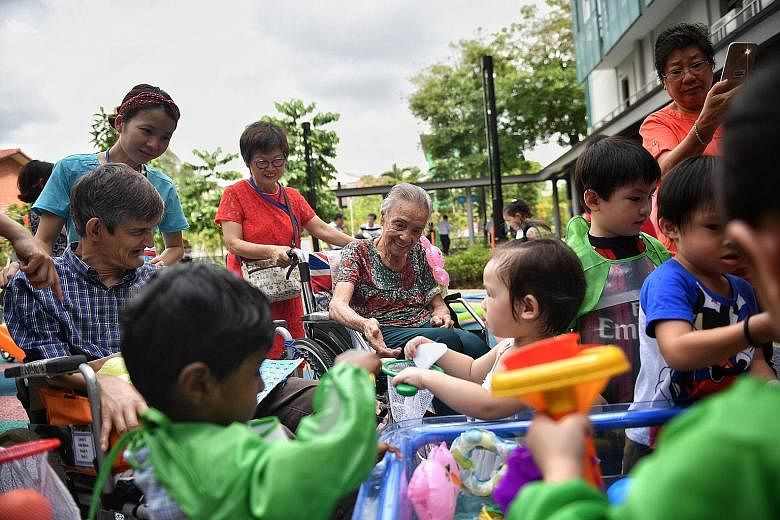A bubbly child would bring a smile to the faces of most elderly people, but opportunities to interact with the young are not always easy to come by.
For one thing, multi-generational households, where seniors live with their children and grandchildren, are becoming less common here.
Such regular inter-generational bonding is important for the elderly's well-being, and more should be done to promote such opportunities, say sociologists, geriatric experts and MPs.
This call comes on the heels of the launch at St Joseph's Home of an inter-generational playground, infant and childcare centre this week on the premises of the nursing home.
The Government also plans to co-locate childcare and eldercare facilities in 10 new housing developments, with the first opening at Kampung Admiralty in Woodlands.
Such initiatives will help the elderly stave off problems such as social isolation.
Associate Professor Philip Yap, director of the geriatric centre at Khoo Teck Puat Hospital, pointed out that overseas studies show that seniors who mixed with young kids showed improvements in brain and physical functions.
Research also showed that the elderly helped the children to "improve their behaviour and literacy skills", he added.
This can be observed at St Joseph's childcare service, which has been running for about a month. Children and the nursing home residents are allowed to interact under the supervision of staff.
Principal Frances Yap said: "Such mixing helps the children in their social development. They develop empathy and learn to help others, such as when they aid the elderly in performing tasks because their hands can be weak."
Mr Don Tan, centre manager and senior social worker at Tsao Foundation's Hua Mei Elder-centred Programme of Integrated Comprehensive Care, said: "Elders are generally more happy when there are kids around - the latter's spontaneity and energy is almost infectious.
"As three-generational homes have become less common over the years and more older people live by themselves, inter-generational common spaces are becoming more important," he added.
MPs in areas with a high proportion of older residents are on board with the notion of creating more of such spaces.
MacPherson MP Tin Pei Ling said that simple things such as building a children's playground and senior citizens' fitness corner next to each other can be effective.
"It ensures that the two generations don't just miss each other, but learn to understand each other and bridge that generation gap."
Marsiling-Yew Tee GRC MP Alex Yam said that having a "good mix of different flat types" could also help multi-generational families or residents of different ages to settle in the same area. "In the Limbang area, there are studio apartments, three-room and four-room flats. Older and younger residents can look out for each other," he said.
Ang Mo Kio GRC MP Ang Hin Kee suggested that more facilities could be shared between the young and the old. An underused swimming pool, for example, could be a space for elderly folk to receive therapeutic water treatment and young children to learn water safety.
After all, bringing the old and the young together more often is a nascent trend in ageing populations in other countries.
Associate professor of sociology at the National University of Singapore (NUS) Daniel Goh said: "Some countries like Japan and the United States have started this too.
"It's not just co-location of facilities, but programmes that bring the two generations together in their everyday life."
NUS sociologist Tan Ern Ser said he is studying how inter-generational mixing could "contribute to ageing-in-place and prevent the marginalisation of seniors, keeping them engaged with their respective communities for all ages".
"The opportunity to bond, care, and share their skills and stories may give meaning and a sense of purpose to their lives."


